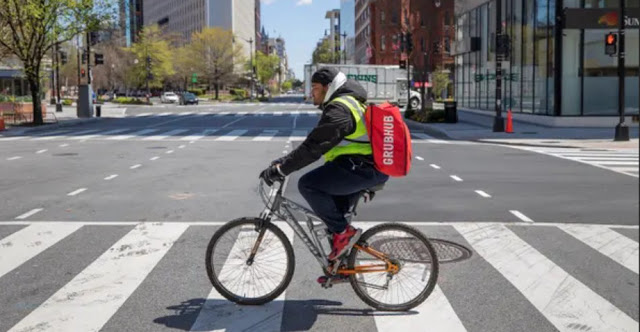Pandemic has created divides, socioeconomic and political

A GrubHub delivery is made in Washington, D.C. (Photo by Erik S. Lesser, European Pressphoto Agency)
—–
Former labor secretary Robert Reich, a professor at the University of California, Berkeley, writes for Common Dreams that the pandemic has created four new socioeconomic classes. In The New Yorker, Robin Wright summarizes and elaborates on them:
- “Remotes” are professional, managerial, and technical workers still at their jobs, usually remotely and usually for the same pay.
- “Essentials” include health care, the food-supply chain, police and other first responders, and truck drivers, about 30 percent of workers, many of whom “are putting their lives at risk with limited physical or economic protection,” Wright notes.
- “Unpaids” are the growing numbers of the unemployed, the furloughed and personal-services workers whose task can’t be done remotely. “So far in this crisis, 43 percent of adults report they or someone in their household has lost jobs or pay, according to the Pew Research Center,” Reich notes.
- “Forgottens” are migrant workers, the homeless, Native Americans, the disabled, the elderly, and the imprisoned. “Outbreaks in nursing homes, homeless shelters, and prisons have proved among the most merciless,” Wright writes.
In Kentucky, African Americans have accounted for 18 percent of deaths from covid-19 though they are only 8.3 percent of the state’s population, and Latinos have a higher rate of coronavirus cases than their population share.
Black, Latino and poor Americans “aren’t getting what they need to survive this crisis because they don’t have lobbyists and political action committees to do their bidding in Washington or state capitals,” Reich argues. “The Remotes among us should be concerned, and not just because of the unfairness of the covid-19 class divide. If the Essentials aren’t sufficiently protected, the Unpaid are forced back to work earlier than is safe, and the Forgotten remain forgotten, no one can be secure. Covid-19 will continue to spread sickness and death for months, if not years to come.”
Wright, after citing Reich’s insights, writes of another split: “The most dangerous divide emerging from the pandemic is the oldest in American history—over the rights and duties of the states versus the power of the federal government. We fought a war over the issue a hundred and sixty years ago; it has flared again during the pandemic—and now threatens to tear the nation apart in new ways.”
“The impact could outlast the pandemic’s pathogens. The American social contract—based on the “inalienable rights” of “life, liberty and the pursuit of happiness” in the Declaration of Independence—was already eroding; the interpretations were being redefined, a process begun by Reaganism in the 1980s as part of a sustained attack on the role and meaning of government, David Blight, a Yale historian, told me. From the Civil War to the 1970s, government expanded its reach to try to insure the same rights for African-Americans, women, Native Americans, the disabled, veterans, the elderly, and the ill.
Government grew to fight wars and secure the homeland, improve the economy, advance education, and institute the first environmental protections. “But part of our political culture has never really supported this long and seismic change and done the best to roll it back,” Blight, who grew up in Flint, Michigan, told me. During the pandemic, those opposed to expansive government have decried shelter-in-place orders as excessive and questioned the recommendations of the government’s top health officials. . . .
The existential but conflicting issues spawned by the pandemic—the right to life and physical health versus the right to liberty and economic health—have provided the perfect vector for new fissures in America. The gun-toting protesters may be a minority, but polls show that the President’s positions on the role of the state during the pandemic have solid public backing. In the midst of Trump’s skirmish with (Michigan Gov. Gretchen] Whitmer, his job-approval rating soared by six points, to 49 percent, according to a new Gallup poll released on Thursday. It tied for Trump’s personal best in Gallup’s polling data; 47% disapprove. America is a country evenly and bitterly divided. But Americans should remember, Blight added, “There won’t be any blue or red rooms in heaven.”